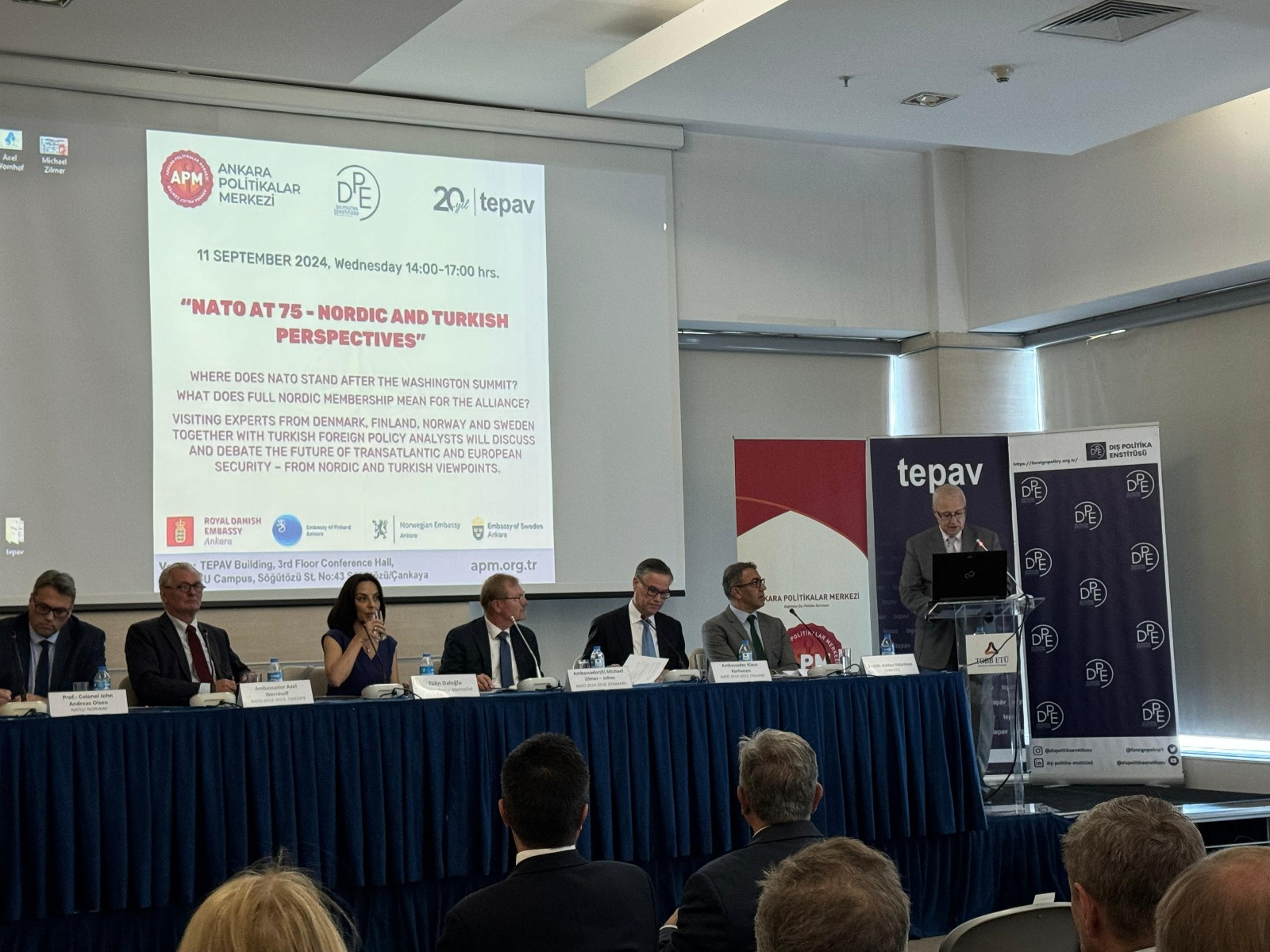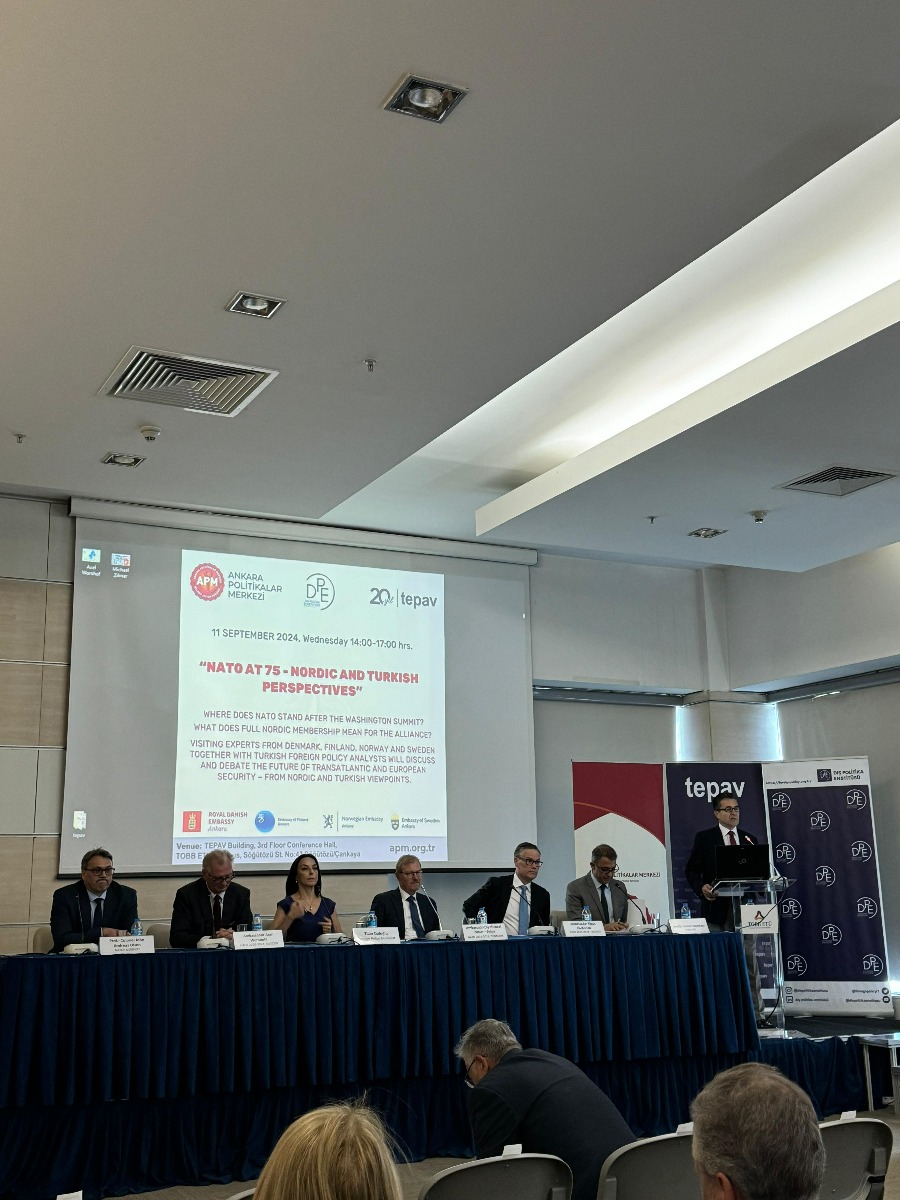NATO at 75- Nordic and Turkish Perspectives
Seminar held on NATO's 75th anniversary focused on perspectives of Nordic Countries and Türkiye about the future of North Atlantic Treaty Organization (NATO).
The Finnish Embassy, along with the embassies of Norway, Denmark, and Sweden, co-organized a seminar on NATO's 75th anniversary. The event, held in partnership with the Ankara Policy Center, TEPAV, and the Foreign Policy Institute, focused on the perspectives of Nordic countries and Türkiye regarding NATO membership.

The programme started with the welcoming speech of the retired Ambassador and the Director of the Ankara Policy Center Fatih Ceylan and continued with two panels. Ambassador Klaus Korhonen from Finland, Ambassador Michael Zimmer-Johns of Denmark, Professor Colonel John Andreas Olsen from Norway, Ambassador Axel Wernhoff from Sweden and Professor Dr. Haldun Yalçınkaya and Ambassador Tacan İldem from Türkiye were the distinguished speakers of the panels.
The seminar was important in the sense that it provided a platform for an in-depth discussion on the past, present, and future of the North Atlantic Treaty Organization (NATO), with a particular focus on the contributions and views of Nordic countries and Türkiye.
The first panel addressed the historical contributions of Nordic countries and Türkiye to European and transatlantic security, while the second focused on the future trajectory of NATO, especially in light of the ongoing war in Ukraine and the evolving security threats posed by Russia.
Finland’s Ambassador Klaus Korhonen offered a unique perspective on Finland’s recent membership in NATO, which marked a historic departure from Finland’s earlier military non-alignment. He explained that Russia’s actions in Ukraine were the primary reason behind Finland’s decision to join the alliance. With Finland now fully integrated into NATO, Korhonen highlighted Finland’s robust military capabilities, particularly in northern Europe, and its readiness to contribute to collective defense. He underlined Finland’s strategic importance in the Baltic and Arctic regions.
Denmark and Norway, both founding NATO members, emphasized that they have been central to securing the Baltic Sea and Arctic regions, particularly against Russian aggression. Sweden, traditionally neutral, mentioned that it chose to have NATO membership in response to shifting security dynamics following Russia’s actions in Ukraine. Turkish participant Yalçınkaya stated that Türkiye is a member of NATO since 1952 and it has played a key role in securing NATO’s southern flank, with a focus on counterterrorism and Black Sea security. All emphasized the growing importance of NATO for regional and transatlantic defense collaboration.

The panel concluded with a unified recognition of NATO’s indispensable role in addressing the Russian threat in light of the ongoing war in Ukraine. All panelists agreed on the need for NATO to strengthen its readiness and deterrence capabilities to ensure collective defense and stability in the region.
The second panel focused on NATO’s future, allowing each panelist to share their country’s perspective on the alliance’s trajectory and its role in addressing evolving global security challenges.
Ambassador Klaus Korhonen outlined Finland’s vision for NATO’s future, with emphasis on strengthening the collective defense of the Alliance. Korhonen also emphasized the importance of NATO’s adaptability to new and emerging threats. Developing societal resilience is important. Korhonen expressed hope that one day Russia will be ready for dialogue on the basis of security, sovereignty and territorial integrity of its neighbours.
The panel emphasized the need for NATO to adapt to a range of emerging security challenges, including cyber and hybrid warfare, while maintaining a unified and resilient front against external threats like Russia. Flexibility in responding to both traditional and new forms of warfare was deemed essential for the alliance’s future. Additionally, there was a call for NATO to address broader security concerns, such as terrorism and regional instability, with increased attention to areas like the Black Sea and Middle East.
Conclusion
The seminar offered a comprehensive overview of NATO’s role in maintaining European and transatlantic security, particularly in the face of the Russian threat and the war in Ukraine. Through the Nordic and Turkish perspectives, the discussions highlighted NATO’s adaptability to evolving security challenges and highlighted the alliance’s ongoing importance for collective defense. As NATO reaches its 75th anniversary, the commitment of its members to unity, resilience, and security remains paramount. The seminar made clear that Nordic countries and Türkiye play critical roles in shaping NATO’s future.

